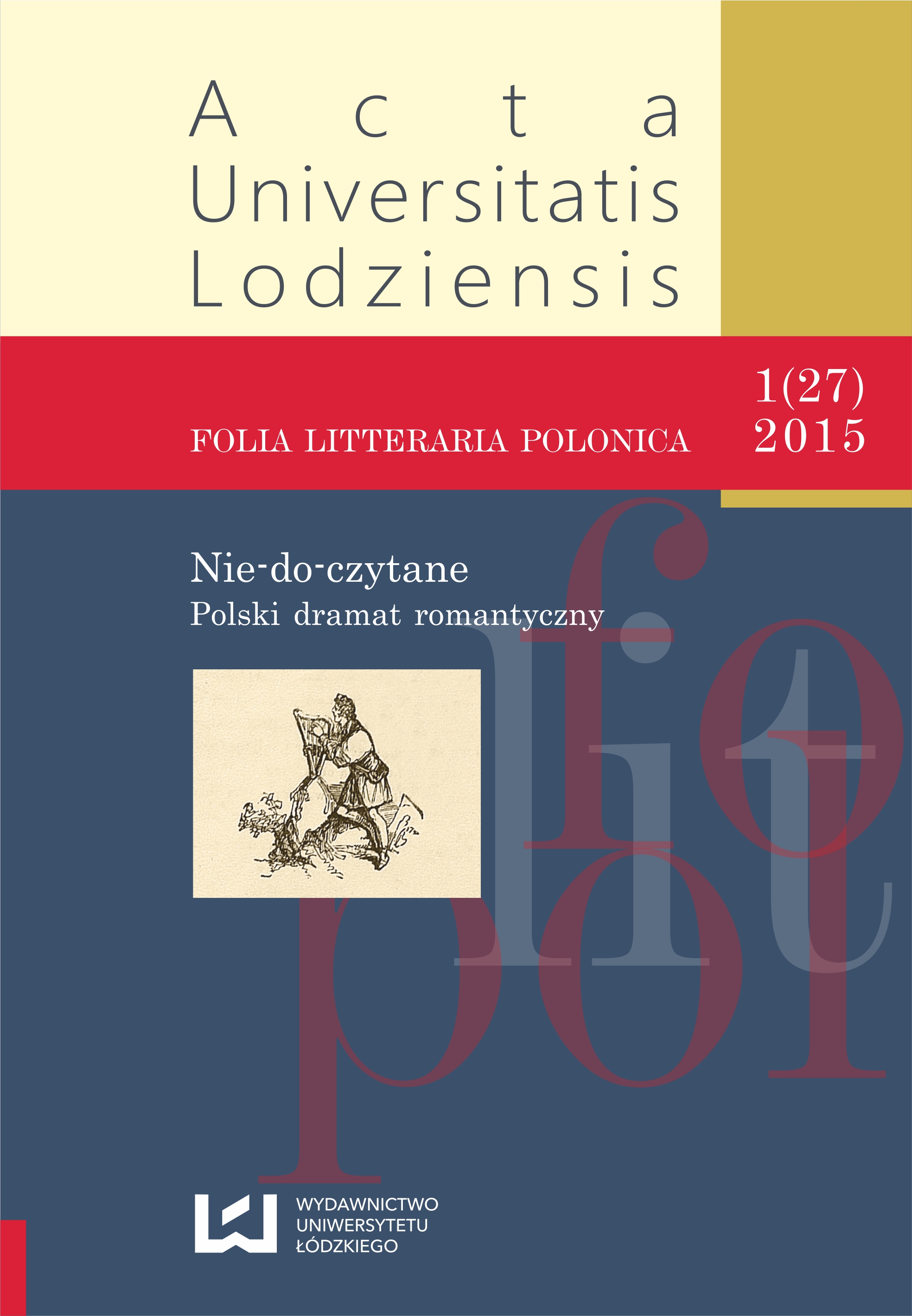‘My Lord is looking for a human with a lamp like Diogenes’ – the place and the role of body in the creation of the identity of characters in the drama Horsztyński by Juliusz Słowacki
DOI:
https://doi.org/10.18778/1505-9057.27.04Keywords:
Słowacki, Horsztyński, body, carnality, identity, awareness, soul, spirit, memoryAbstract
The article is an attempt to interpret one of the most fascinating works of Juliusz Słowacki – Horsztyński drama. The basis of the interpretation is carnality. The main issue of the article is the designation of the role of carnality in the construction of subjectivity of the drama’s characters. The article is divided into four sections, whose titles are quotes from the drama. Each of them concerns some issues related to the category of carnality: connection of jesters’ appearance with their spiritual degeneration, presence and soothing touch, physical suffering, and the relation body-soul-spirit. Considerations in the article aim to answer the question of the continuity of existence and the relation of awareness to the body.
Downloads
References
Bynum C., Skąd taki zamęt wokół ciała (z perspektywy mediewistki), przeł. I. Sławińska, „Teksty Drugie” 2002, z. 5, s. 74–96.
Google Scholar
Chołody M., Ciało – dusza – duch. Dyskurs cielesny w romantyzmie polskim (fragmenty), Poznań 2011.
Google Scholar
Kalinowska M., Mowa i milczenie. Romantyczne antynomie samotności, Warszawa 1989.
Google Scholar
Kalinowska M., O losie w „Horsztyńskim”, [w:] tejże, Los. Miłość. Sacrum. Studia o dramacie romantycznym i jego dwudziestowiecznej recepcji, Toruń 2003, s. 36–59.
Google Scholar
Kuziak M., Fragmenty o Słowackim, Słupsk 2001.
Google Scholar
Ławski J., „Szczęsny pan”. O „Horsztyńskim” Juliusza Słowackiego, [w:] Piękno Juliusza Słowackiego. W 200. rocznicę urodzin i 160. rocznicę śmierci poety, t. 2, pod red. J. Ławskiego, G. Kowalskiego, Ł. Zabielewskiego, Białystok 2013, s. 287–309.
Google Scholar
Ławski J., Ironia i mistyka. Doświadczenia graniczne wyobraźni poetyckiej Juliusza Słowackiego, Białystok 2005.
Google Scholar
Ławski J., Wstęp, [w:] J. Słowacki, Horsztyński. Tragedia w pięciu aktach, oprac. J. Ławski, Wrocław 2009, BN I 314, s. V–CXXXVII.
Google Scholar
Płaszczewska O., Błazen i błazeństwo w dramacie romantycznym. Studium komparatystyczne, Kraków 2002.
Google Scholar
Przybylski R., Rozhukany koń. Esej o myśleniu Juliusza Słowackiego, Warszawa 1999.
Google Scholar
Ratajczakowa D., Wóz dwukonny. Rozważania o jednym antycznym motywie w „Horsztyńskim” Juliusza Słowackiego, [w:] tejże, W krysztale i w płomieniu. Studia i szkice o dramacie i teatrze, t. 2, Wrocław 2006, s. 289–302.
Google Scholar
Słowacki J., Anhelli, [w:] Poematy, nowe wydanie krytyczne, oprac. J. Brzozowski i Z. Przychodniak, t. 1, Poznań 2009, s. 395–461.
Google Scholar
Słowacki J., Dzieła wybrane, red. J. Krzyżanowski, t. 6. Listy do matki, oprac. Z. Krzyżanowska, Wrocław 1990.
Google Scholar
Słowacki J., Horsztyński. Tragedia w pięciu aktach, oprac. J. Ławski, Wrocław 2009, BN I 314.
Google Scholar
Downloads
Published
How to Cite
Issue
Section
License

This work is licensed under a Creative Commons Attribution-NonCommercial-NoDerivatives 4.0 International License.











